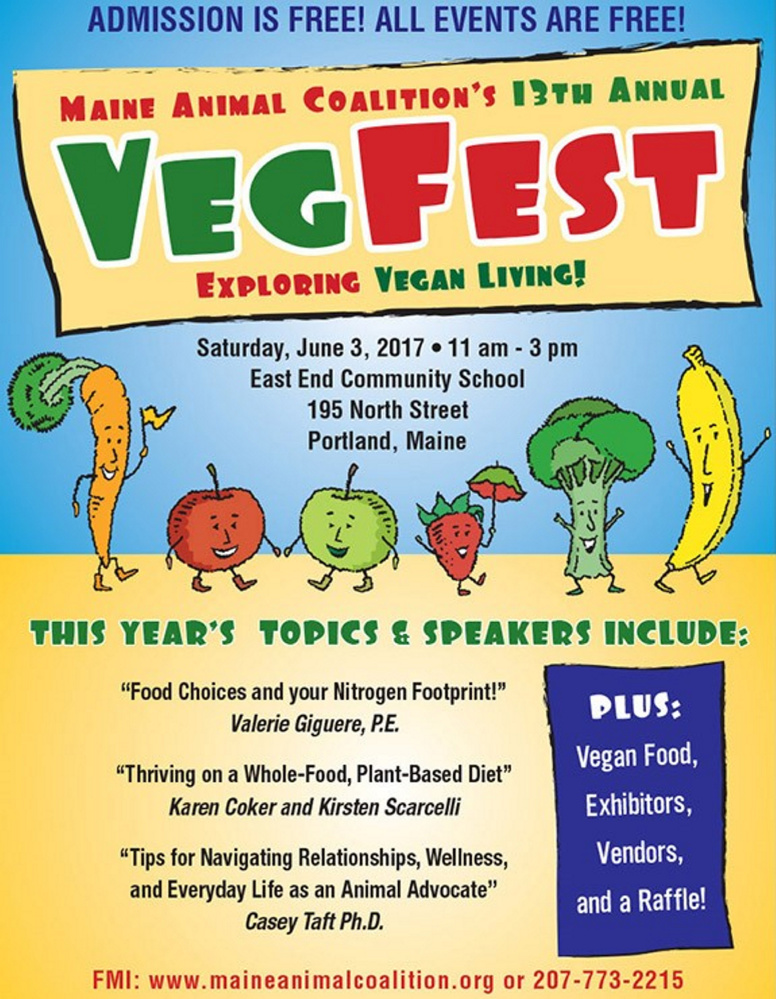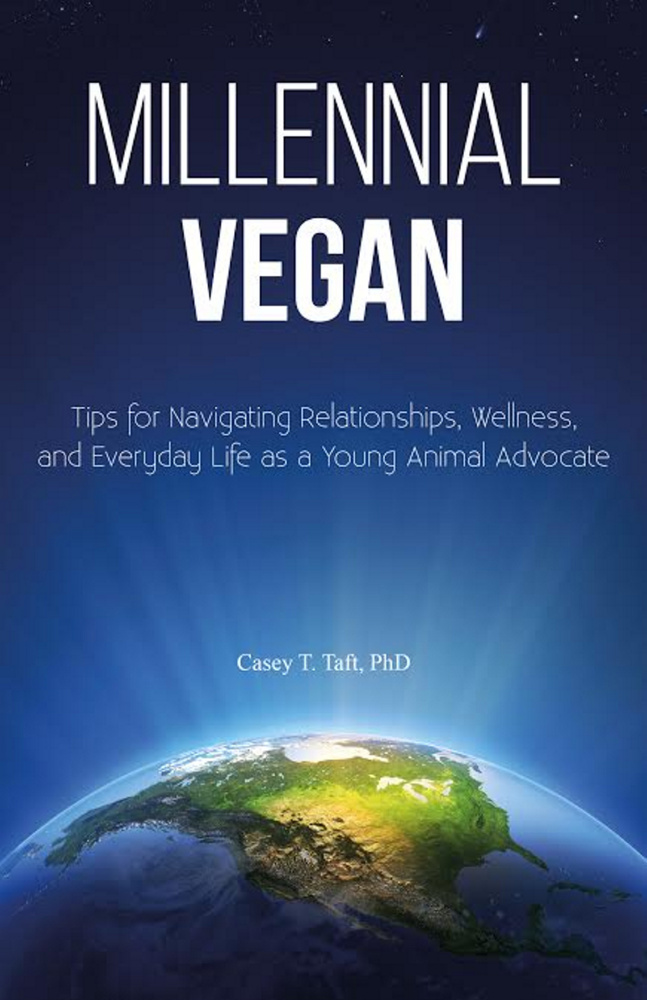Lowering one’s carbon footprint is all the rage, but few of us consider our nitrogen footprint.
Val Giguere would like to change that.
Giguere, an environmental engineer from Wells who works in the wastewater field, will speak about “Food Choices and Your Nitrogen Footprint” at this year’s VegFest in Portland.
In her 11:15 a.m. talk, she’ll outline how nitrogen pollution enters and alters our environment and how it’s tied to what we eat. She gave me a quick preview: As with carbon pollution, animal farms are the leading source of nitrogen pollution, Giguere said.
When nitrogen is loose in the environment it causes what scientists describe as a nitrogen cascade, where each atom of nitrogen contributes to a sequence of events, including climate change, acid rain, smog formation, ozone depletion, toxic algae blooms, ocean dead zones, forest dieback and groundwater contamination.
“The biggest source of nitrogen that is going into the environment is the new (petrochemical) fertilizer we’re making to put on fields to feed animals,” Giguere told me.
The other top source of nitrogen pollution, according to Giguere, comes from the 1 billion tons of animal manure piling up in the U.S. each year. This dwarfs the 18 million tons of human waste generated in the U.S. each year, she said.
The nitrogen pollution from animal farms comes from “the quantity of waste and the fact that there is no treatment for animal manure,” Giguere said. On factory farms, lagoons of waste surround the barns and the contents are periodically sprayed raw – without composting or treatment – onto the fields. These lagoons are prone to rupture during flooding.
In contrast, the Clean Water Act mandates human waste be treated in a septic tank system or wastewater treatment plant.
Other sources of nitrogen in the environment include urban stormwater runoff, burning fossil fuels and food waste.
So where does nitrogen lurk in food? Giguere explained that nitrogen equals protein. The bulk of nitrogen pollution comes from human consumption of meat, Giguere said, and “because people are eating way more protein than they need to, it has exacerbated the number of animals being raised for people to eat.”
The programming for this year’s VegFest includes food, exhibitors and two other talks.
At 1 p.m. Karen Coker and Kirsten Scarcelli, the Portland-based founders of Plant IQ, will discuss “Thriving on a Whole-Food, Plant-Based Diet.” Scarcelli, a certified holistic health coach, will give an overview of the science behind a plant-based diet and then discuss the foods people eat when they follow a whole-food, plant-based diet, which differs somewhat from a vegan diet.
“We’ll wrap up with some practical tips on how to transition and find support,” Scarcelli said, “And we’ll share online resources, books and cookbook suggestions.”
At 2 p.m., Boston-based author Casey Taft takes the stage to talk about the subject of his new book “Millennial Vegan.” The millennial generation, now 15 to 34 years old, accounts for almost half of all vegans.

Wastewater engineer Val Giguere will talk at VegFest about the link between meat consumption and the nitrogen pollution harming the environment.
In the book, Taft, a psychologist, uses his conflict prevention and resolution skills to guide new vegans through the obstacles of modern life.
“I am incredibly impressed by young people who go vegan despite all of the barriers to doing so,” Taft wrote me in an email. “I run the Vegan Publishers’ Facebook page and regularly get messages from young vegans who describe various struggles, ranging from difficulties in getting along with parents, to being forced to eat animals despite their ethical beliefs, to dealing with bullying at school for being vegan.”
The festival features more than 30 exhibitors and vendors, including Flying Fox Juice Bar, Hippy Cakes Vegan Bakery, Heiwa Soy Beanery, Frinklepod Farm and Delicious TV (handing out samples of Miyoko’s Kitchen plant-based cheeses).
Lunch, for sale in the cafeteria area, features vegan salads and sandwiches from the Portland Food Co-op, Terra Cotta Pasta and Chow Maine.
The annual event is sponsored by the Maine Animal Coalition and typically attracts close to 800 people to the LEED-certified energy-efficient elementary school overlooking downtown Portland.
Maine Animal Coalition president Beth Gallie said festival organizers work to make sure the event offers fresh experiences every year.
The significant growth in vegan cookbook authors and practitioners of plant-based medicine in recent years has meant that getting new speakers for VegFest each year is easy, Gallie said.
“We try to have new food items every year to keep it interesting,” Gallie said, adding that the VegFest lunch always showcases vegan dishes available at Portland area restaurants.
Since all of the food will be vegan, the festival’s nitrogen footprint will be low and festivalgoers can leave with a full stomach and a clear conscience.
Avery Yale Kamila is a food writer who lives in Portland. She can be reached at
avery.kamila@gmail.com
Twitter: AveryYaleKamila
IF YOU GO
WHAT: VegFest, hosted by the Maine Animal Coalition, the 13th annual festival features speakers, vegan food, plant-based exhibitors, veg-friendly vendors and a raffle of veggie goodies.
WHEN: 11 a.m. to 3 p.m. June 3
WHERE: East End Community School, 195 North St., Portland
HOW MUCH: Free admission
INFO: maineanimalcoalition.org
WHAT ELSE: Track your own nitrogen footprint here: n-print.org.
Send questions/comments to the editors.




Success. Please wait for the page to reload. If the page does not reload within 5 seconds, please refresh the page.
Enter your email and password to access comments.
Hi, to comment on stories you must . This profile is in addition to your subscription and website login.
Already have a commenting profile? .
Invalid username/password.
Please check your email to confirm and complete your registration.
Only subscribers are eligible to post comments. Please subscribe or login first for digital access. Here’s why.
Use the form below to reset your password. When you've submitted your account email, we will send an email with a reset code.